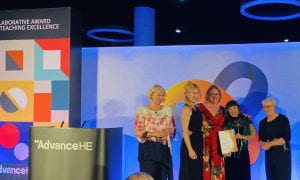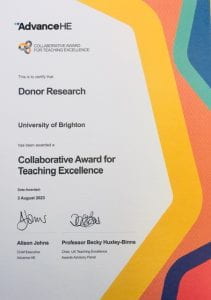Collaborative Excellence in Addressing Healthcare Inequalities
In the realm of higher education, the spirit of collaboration often lies at the heart of groundbreaking innovations and transformative change. It is a truth universally acknowledged that teamwork, when fueled by dedication and innovation, can lead to remarkable accomplishments. This sentiment was celebrated in style at the 2023 higher education awards ceremony in Birmingham on 28 September, where the Donor Research team from the University of Brighton received the prestigious Collaborative Award for Teaching Excellence (CATE). This recognition underscored their outstanding contribution to higher education, particularly in addressing health inequalities and shortages in blood and organ donations across the United Kingdom.

Recognising Collaborative Excellence
The Collaborative Award for Teaching Excellence (CATE), established in 2016, serves as a beacon of recognition and reward for collaborative efforts that have left an indelible mark on teaching and learning. This initiative highlights the pivotal role of teamwork in the sphere of higher education.
Simonne Weeks, Director of Donor Research explains “the team’s victory at the 2023 CATE awards is a testament to their remarkable achievements in co-production projects with students, aimed at combating health disparities and addressing the dire shortage of blood and organ donations in the UK.”
“team’s victory at the 2023 CATE awards is a testament to their remarkable achievements in co-production projects with students, aimed at combating health disparities and addressing the dire shortage of blood and organ donations in the UK.”

A Catalyst for Change
Donor Research is a shining example of what collaboration, innovation, and dedication can achieve in the pursuit of addressing pressing societal issues. Comprising healthcare professionals, academics, and students primarily from the University of Brighton and the Brighton and Sussex Medical School, this award-winning National Health Service Blood and Transplant (NHSBT) funded network operates in partnership with experts from institutions such as King’s College NHS and the Universities of Bedfordshire, Stirling, and Northumbria. In the coming months they will be expanding their reach and impact working with esteemed partners including experts in Sickle Cell experience and care:
Stephanie George: Sickle Cell Advocate from RedCellsRUs
Dunstan Niol Wilson: Sickle Cell Advocate
John Niagal : Sickle Cell and Stem Cell Transplant Advocate
Jenica Leah: Sickle Cell Advocate and Author of MyFriendJen
Dr Steven Okoli: Consultant Haematologist, Imperial College Healthcare NHS Trust Adult stem cell transplant lead for sickle cell disease
They will also work with local and international creatives:
- Sara Kenney: Wowbagger Productions with expertise in running comic creation workshops
- Shelly Bond: Off Register Press with Philip Bond illustrator for Tank Girl
- Imogen Mangle
- The New Black Film Collective
- Sarah Akinterinwa
Filling Critical Gaps
Founded in 2020, Donor Research identified a critical gap in academia: limited opportunities for undergraduate students and healthcare professionals new to the field to engage in research focused on innovative solutions to combat the organ and blood shortage in the UK. With over 6,000 blood donations needed daily to treat patients in England and more than 6,000 people awaiting transplants, their mission was both crucial and ambitious.

An Inclusive Approach to Research
Donor Research’s unique approach is grounded in the National Institute for Health and Care Research (NIHR) co-production principles, which promote innovation, inclusivity, and sustainable growth. Students, recruited as Champions, stand as equal learning partners alongside seasoned academics. They form a dynamic community that thrives on respect, trust, and open communication, and they are empowered with the necessary resources and support for success.

Changing Perspectives through Collaboration
Donor Research’s collaborative efforts have yielded impressive results. Through a diverse array of in-person workshops and interactive debate-style learning sessions, they’ve engaged in meaningful conversations with over 600 students, indirectly reaching more than 20,000 students through freshers’ fair events. Their tireless work in raising awareness about blood and organ donation, as well as increasing the diversity of the donor pool in the UK, is showcased on an Edublog site with over 3,000 views and through social media campaigns with over 300 followers.
Inspiring Change Through Excellence
Through their dedication to teaching and learning, research, collaboration, and leadership, Donor Research has become a beacon of inspiration for other academics. They encourage the adoption of similar co-production models, equipping more students with the skills and knowledge they need for professional practice while simultaneously transforming them into advocates for change.
In conclusion, the Collaborative Award for Teaching Excellence serves as a reminder that when individuals come together with a shared purpose and a commitment to excellence, they can achieve remarkable feats. The Donor Research team’s victory underscores the power of collaboration in addressing real-world challenges and making a meaningful impact in the field of healthcare and education. Their story is a testament to the transformative potential of teamwork and serves as an inspiration for educators and students alike.
Find out more on how to get involved here
Simonne Weeks is the Director of Donor Research and has the honour of working with co-founder Rebecca Craig (Chief of Operations) and Joey Fanstone (Chief of Champions). Other key members of the core team include Connor Thompson (Pharmacy advisor and Lead on Digital Communications) and Charlotte Humphris (Nursing advisor). The core team also includes students who equal learning partners who contributed to this CATE application: Estella Brown, Alice De Courcy Thompson, Lois Leese, Amber Anscombe, Nadeen Alay.
